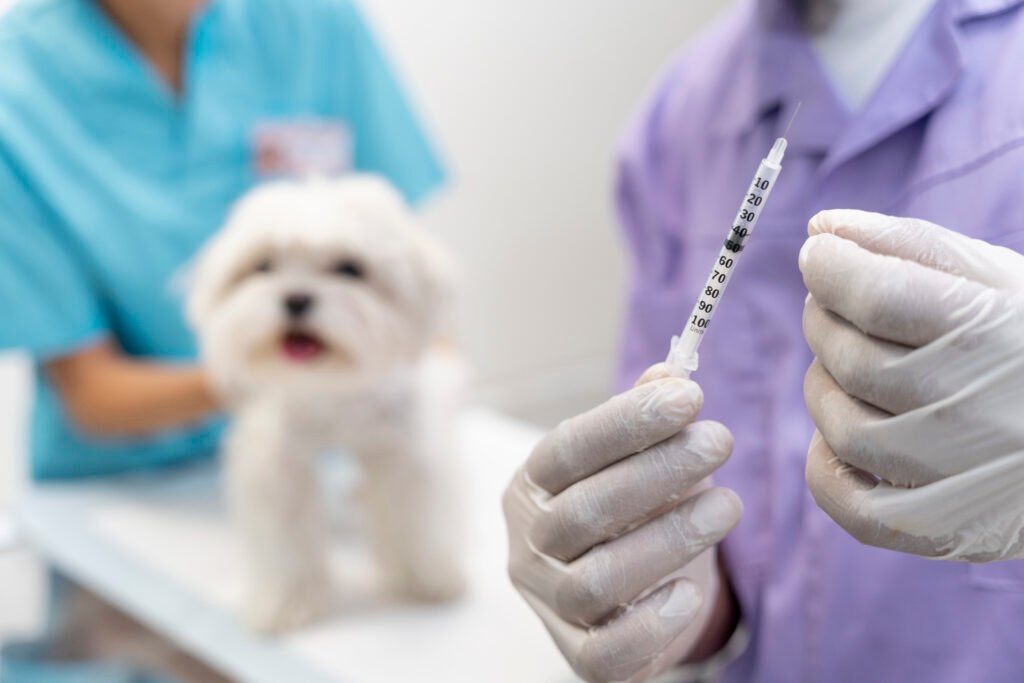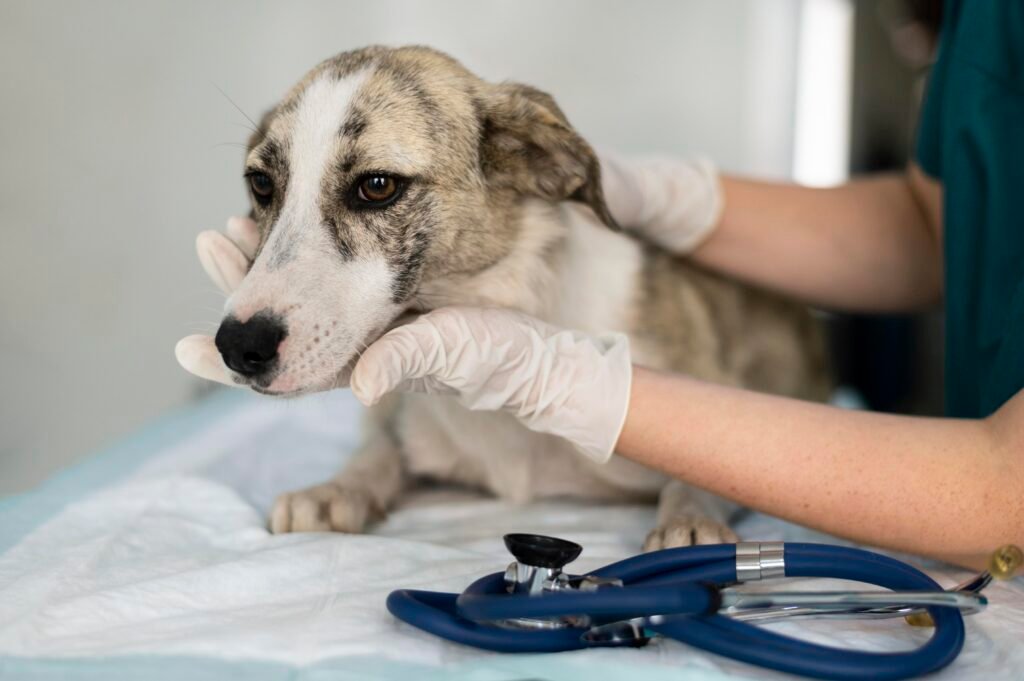Do pets require booster shots?
Booster shots are designed to boost a pet’s immune response to certain infectious diseases. Contrary to what anti-vaccine sentiment may lead you to believe, once that first round of vaccines has created a basis of immunity in your pet’s body, it is booster shots that help maintain that immunity as it starts to fade away over time.
Booster shots are just as important for pets as they help maintain immunization against serious diseases or update protection with pathogen exposure that occurs in nature. This is especially important with core vaccines that protect against very serious diseases, such as parvovirus infection in dogs or feline panleukopenia virus disease in cats. The intervals for booster shots are important and vary depending on your pet’s age and health status, breed, lifestyle, and geographic area. Veterinary visits and consultations with your veterinarian will direct you on what kind of vaccination program every pet needs based on their unique issues, exposures, or health conditions. Immune booster shots are important to help keep your pet safe from these deadly diseases.

Recent studies explore the timing and need for immune booster shots in various species, breeds, or classes of companion animals.
It comes from new research and emerging trends as to the science behind vaccine protocols for your pet, including how often or even if certain booster shots are necessary. This is a summary of certain breeds or types of pets, and what the current trends in research show.
New Developments and Studies on Boosters for Certain Breeds or Types of Animals
Introduction
Veterinary medicine is a constantly changing field; research continues as we learn more about vaccinating our patients. The way that booster shots are administered is starting to change due in part perhaps, from recent studies and trends involving breeds of pets. Knowledge of these patterns could ensure that vaccination strategies are adapted to provide protection for the pet.
1.Vaccine Reactions by Breed
Breed Variability:
Scientists believe that divergent responses to vaccines by dog breeds are due in part at least on genetic variation, research has shown. For instance, smaller breeds or some of the more susceptible for ailment might have different immune responses as compared to large ones. This variation has recently resulted in increased interest regarding breed-specific vaccine requirements.
Vaccination Protocols Made for You.
More and more veterinarians are tailoring vaccine schedules to breed-specific concerns. However, some breeds may also have different needs for booster shots — such as those who are prone to certain health problems like Boxers or Doberman Pinschers. Tailoring protocols for these activities may reduce this variability, with potential translation into improved vaccine efficacy.
2.Age-Related Considerations
Puppies and Kittens:
As new research emerges, vaccination schedules for young animals are becoming more and more refined. For adult animals the timing and frequency of booster vaccines is going to be a series based on maternal antibodies as well as on having grown an effective immune system. Research now is honing in on making the first dose as powerful and enduring a hub of protection that can be built.
Senior Pets:
A decrease in immune system health is associated with normal aging, and this may affect an older pet’s ability to respond appropriately to vaccines. Further research is looking at the senior pets how often they need re-vaccination shots, and whether we should be altering our vaccine choices or schedules to ensure adequate protection.
3.How long the immunity lasts; and Titer Reserved
Extended Duration of Immunity
Now, fresh results indicate that a few of the vaccines just might offer lasting protection too. That has sparked a re-evaluation of the timing for booster shots. For example, the recommended frequency of administration of core vaccines in dogs and cats may not really need to be as frequent.
Titer Testing:
One promising tool to determine when a booster is warranted: Titer testing — which tests the level of antibodies in blood. Some evidence supports using titer tests to confirm your pet still has sufficient immunity, which may allow fewer unnecessary booster shots. This is also going for specific breeds and disease-oriented approach
4.Vaccine Reactions and Safety
Adverse Reactions:
Some studies are now investigating vaccine safety and not just the dosing. With a new generation of vaccines making their way, some studies suggest that the vaccine reactions including allergy and side-effect responses are guiding doctors to come up with safer booster shot protocols while maintaining efficacy.
Reducing Over-Vaccination:
We are awakening to the consequences of over-vaccination and all is revealed, physical health challenges that do not need to be issues. Newer guidelines were introduced intending to strike a balance between effective prevention of allowable diseases and the associated risks from too many vaccines. This includes the timing of booster shots depending on individual health and risk factors.
5.Geographical and climate related reasons
Regional Variations:
Geography and environmental input will decide on the length of time between necessary booster shots. Additionally, pets living in regions with more prevalent diseases (like Lyme disease or leptospirosis) might have unique vaccination requirements compared to those residing in lower-risk areas.
Lifestyle and Exposure:
The vaccination programs for pets at high risk (such as those that commonly come into contact with other animals while staying in boarding facilities or playing in dog parks) may need to be different than vaccinations given to a pet not involved in these types of activities. A new study is taking a closer look at how lifestyle factors might impact the effectiveness of immunizations and whether or not people need booster shots.
Conclusion
New paradigms > trends and developing research are shaping the next phase of booster shots for pets. Veterinary medicine addressing a more tailored and efficient vaccination protocol targeting breed specific response, age related necessity, duration of immunity investigations, safety issues geographic area site. Keeping up with these developments and consulting your veterinarian will help ensure that your pet receives the best care possible and stays protected from illness.

Evaluate your pet's health and dietary needs with your veterinarian to determine if a booster is necessary.
There are a few things that have to be taken into account when deciding if your pet with ongoing health issues, or who is on medication/ special diet will need additional vaccine boosters. With that in mind, let’s go through a more methodical process of determining if we need boosters.
When to Give Booster Vaccinations Cats with Health Problems or on Special Diets
Introduction
These dogs might need an adjusted vaccination schedule, if they are on a specialized diet or have other chronic health issues. Being familiar with these determinants is key to knowing when exposure to booster doses may be necessary for your pet and how effective disease prevention can be met.
Do Pets with Chronic Health Issues Benefit from Booster Shots
On Health Terms, The Tip of the Iceberg:
Type and extent of chronic health problems are the main indicating elements that determine what kind of booster doses are required by your pet. Certain conditions, such as diabetes, kidney disease and cardiovascular diseases or auto-immune disorders can affect how the immune system reacts to vaccines. One potential example is that chronic kidney disease might suppress the immune response to vaccines.
Consulting Your Veterinarian
I urge you to have your dog examined by a veterinarian. Then, they will evaluate your pet for general health as well and look to see how the chronic condition may compromise vaccine potency with regards to effectiveness. In some instances, they recommend changing the vaccine schedule or using other interventions to provide sufficient immunity.
Monitoring Immunity
Blood titer testing can be useful for long-term illness management in a pet that has chronic health problems. This means you may not have to get your pet vaccinations every year, and a titer test can determine if they still are immune from their previous vaccines. After a physical examination, your pet’s veterinarian can recommend if titers are appropriate for determining which vaccines may be due or overdue (serologic testing).
Pets on special diets certain factors need to be considered:
Impact of Special Diets
Those on special diets, such as those used to help manage allergies or obesity, or for specific medical conditions, which can play a role in overall health and immune function. Most of the specialized diets that are available will not harm your pet so much as they leave them nutritionally wanting in one sense or another, which could interfere with how effectively their body is able to respond and utilize a vaccination.
Evaluating Nutritional Status
Getting enough nutrition is one of the fundamental factors for having a strong immune system in your pet. Additionally, if your pet is on a particular diet, speak with your veterinarian about whether they are receiving optimum nutrition and any changes that can be made to help their immune function.
Modifying the way you vaccinate
If the special diet affects your pet’s health, depending on how much of an impact it has had and when you started feeding them that food approximately within 3 to 6 weeks booster shot may need more or less be administered. If diet change is related to controlling specific health problems, you may need to wait until the pet’s condition stabilizes before giving a booster shot.
Regular Health Check-Ups
Routine Veterinary Visits
Whether your dog has a special diet or chronic health issue, regular visits to the vet are important. These visits enable your veterinarian to keep tabs on your pet’s health, evaluate the efficacy of any treatments or diet changes you have implemented and help formulate a smart approach regarding vaccination protocols.
Tailored Immunization Schedule
Your veterinarian can develop a vaccination schedule for your pet based on the results of health assessments and ongoing treatments. This type of personalized guidance ensures that booster shots are given at the optimal times to maintain protection.
Conclusion
One-pet/one-health lifestyle works because the environment is conducive to allowing pets with chronic medical problems, special nutritional requirements or who have a hybrid immune response to only be considered for boosters. Remember, your dog will not benefit from all the vaccines out there and being a well versed pet owner should assist you in navigating this need to vaccinate with each of their unique health conditions. Doing this will help to keep your pet healthy and provide them with adequate protection against disease.

Booster shots may interact with other medications or treatments, so consult your veterinarian for guidance.
See a much more extensive list of how booster shots could interact with any medications or treatments your pet may be receiving:
COVID Booster Shots – Can These Affect Other Medications or Treatments my Pet is Already Receiving?
Introduction
- Booster shots are important to ensure the immune system has a good memory in future years to prevent many types of diseases. Nevertheless, the way these vaccines can interface with other existing treatments or drugs your pet is getting. Knowing this can be crucial when caring for your pet to keep them as well cared for and protected from infection.
Possible interactions between booster shots and drugs
Immunosuppressive Medications
Animals being treated with immunosuppressive drugs, such as corticosteroids (e.g. prednisone) or anti-cancer drugs and those intended for autoimmune diseases may not mount an adequate immune response to vaccines including booster vaccinations in accordance with the vaccination schedule due standard recommendations are that these be avoided during treatment period if possible but clinical cases should still result from benefit / risk assessment of individual case These drugs dampen the immune system and may contribute to a less optimal reaction against the vaccine. If so, the booster shot likely may not be protective. If your dog is repeating the antibody test eviction experience despite still being within one year of vaccination, your veterinarian might recommend changing their vaccine protocol or looking into more advanced methods for determining immunity (like titer testing).
Antibiotics and Vaccinations
In general, antibiotics do not interact with the efficacy of vaccines. On the other hand, should an antibiotic be required because of some infection in progress at time of vaccination it could represent underlying health that will impact immunity. However, antibiotics by themselves are neutral with respect to vaccine efficacy but having a healthy pet not currently battling infection is essential for optimal vaccine response.
THE INTERPLAY BETWEEN LONG-TERM MEDICATION USE AND VACCINE IMMUNE RESPONSE
Chronic medical conditions such as diabetes, heart disease or kidney disease may put your pets at a greater risk of altered immune responses. Different conditions have different impacts on vaccine efficacy. For instance, a weakened general immune system as seen in chronically ill individuals may reduce the efficacy of the booster shot. In such cases your vet may advise modifications in the vaccination protocol or more frequent follow-ups.
Vaccination and concurrent treatments
Surgery in Past Six Months or Health
If you have had a pet that has recently been through surgery or is just getting over another big health issue, they may arguably not still be fighting fit with their immune system. Booster shot: Many viral infections produce a catecholaminergic stress, especially in the situation of infection where it is advisable to wait until your cat/pets are fully recovered before giving them booster shots.
Long-term Health Monitoring
Species that have chronic health conditions may benefit from a more personalized vaccine approach. If you bring your ragdoll in for its regular health check-ups, it is recommended that this tune-up take place so the best vaccination schedule can be put together as well as integrating booster shots into other on-going treatments/streamlining processes faster.
Consulting Your Veterinarian
It is very important to keep your veterinarian informed of all the medications and treatments that you are giving to your pet. Having this information is beneficial so your vet can determine the need for booster shots and when to administer them. Vaccination protocols might be tailored according to the health status of your pet, as well as a medical history, and possibly some other interactions with current treatments.
Conclusion
Booster shots are also crucial to continue antibody levels and prevent infectious diseases. Yet interactions with other medications or therapies can affect the efficacy of those vaccines. With the guidance of your veterinarian and taking into account other diagnoses or health status, you can ensure that vaccinations are given appropriately for maximum benefit and will fit within medical care. Regular veterinary check ups combined with open communication really are the key to a holistic care of your pet.
